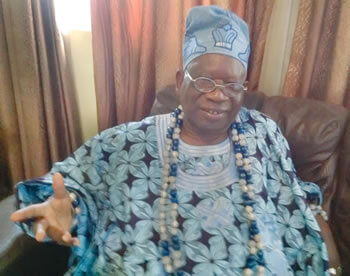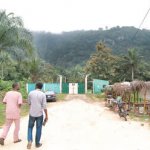The Towulade of Akinale, Owu, Abeokuta, Oba Olufemi Ogunleye is a practising journalist and a law student. He was a former General Manager, Corporate Affairs Division, Nigeria Airways. At 72, the royal father speaks with OLAYINKA OLUKOYA about his passion, life and his responsibilities as a monarch. Excerpts:
You were once a journalist and a public relations officer of the Nigeria Airways before you ascended the throne. How was life when you were in active service?
To say I was once a journalist is a misnomer, because I am still a journalist anyway. Journalism is the only job that I know. I was a reporter with the Middle Belt Herald in Jos, Plateau state, New Nigeria newspapers in Kaduna and later with Daily Times. I moved from Kaduna to Zaria, then to Kano and finally to Lagos, before I retired in 1976 and joined the Nigeria Airways. I joined Nigeria Airways as a public relations officer and finally retired after 25 years in the service of the company.
During those years, did you have any inkling you would become a traditional ruler?
I never once thought about that, although my father was head of the community. Not only him, my grandfather and my great grandfather were leaders because they established the community. I never dreamt that one day I would ever ascend the throne. I should say I came to the throne by accident. When I retired from the Nigeria Airways, my wish was not to be a traditional ruler but to remain an itinerant reporter, moving around the country. I wanted to write stories. I enjoyed it so much.
My former boss at Daily Times, Sam Amuka, who is the publisher of the Vanguard newspapers, called me one day and said I should come and write for him. I was excited. I maintained a column on a weekly basis on aviation for his paper. I really enjoyed it. But in my house in Alakuko, Lagos, there used to be too much noise from a church which was just few metres away; the noise would start whenever I wanted to go on the typewriter to do my job. They erected loudspeakers and they would disturb the neighbourhood at odd hours. I went to meet the owner of the church on the noise pollution but he did not listen to me. I decided not to join issues with him and that prompted me to go back to my country home in Akinale.
I had to beg my wife on this issue that we should make it a point of duty to come each weekend, while returning to Lagos on Sundays. The peaceful atmosphere devoid of the hustling and bustling in Lagos made me return home.
But how did you become king?
As I spent my weekends in the community, I was shocked one evening when some elders came to me, asking me to become their traditional head. I initially rejected it but I saw the seriousness in them. I immediately told my wife that I made a mistake by returning to Akinale after which I apologised. The following morning, we packed our things and returned to Lagos. They came to my house at Akinale the following morning, they did not find us and they came to Lagos on a Sunday morning. The whole thing became fun to me when they said that it was Ifa oracle that picked me. I told them that the oracle did not know my name, but they insisted. In a bid not to be king, I travelled to England. I assumed that upon my return to Nigeria, my people would have found another traditional head. When I got to England, I was lucky to find a young Nigerian running a local magazine for the black minority, and I joined him. He paid me £25 per week and I was happy. I did not think of coming back to Nigeria. On a particular day, I got a directive from Nigeria’s High Commissioner, Baba Ajibola. He told me that they were looking for me and I went. He said that the President would be coming to England and that I should be part of the planning committee.
I accepted the job gladly, but when the President came and the High Commissioner sighted me, he asked: what are you doing here? My response was that I was in England on vacation. He looked at me and said that my people were looking for me in my village to be their head and that I ran away. He then gave a directive that I should return to Nigeria and take up the offer.
What happened after you accepted to become king?
Then, I did not know that there was some misunderstanding among the various clans in Abeokuta— the Egba Alake, Egba Oke-Ona, Gbagura and Owu. I am an Owu man. One day, I just got to Akinale, and while I was still considering the offer, a message came from one traditional head whose domain is not far from my community. He said I was planning to become the monarch of Akinale and that I should come and see him. As a mark of respect for the traditional ruler, I wrote back to inform him that I was not aware that I needed to pay homage to anyone. I went to him and told him about the history of Akinale. I told him that I already had the blessing of the Olowu of Owu, who has the authority on my domain. The ruler threatened that I should not go ahead with the official installation ceremony. I became annoyed and I went back to my people and asked them if the ceremony could come up within 24 hours. I was infuriated by the threat.
What happened after that?
I then wrote a letter to former President Olusegun Obasanjo that for me to become the traditional ruler of Akinale, he (Obasanjo), being the Balogun Owu (Prime Minister), should come and install me, since the Olowu stool was vacant at that time. I said I would only accept if he agreed to install me. I sent the letter to a colleague of mine, the late Mrs Oluremi Oyo, who was Baba Obasanjo’s media aide at that time. I told Remi to read it and ensure that the letter got to the President’s table. Chief Obasanjo got the letter and passed it to the Owu kingmakers. The Owu kingmakers chastised me when they got Baba’s letter and wondered why I had to write him because I wanted to be a traditional ruler. I apologised to them.
How did the installation ceremony go?
On the day, I was to be installed as traditional ruler, I went to supervise the ceremony venue and was shocked to see several policemen. One of the police officers called me. He told me that they had an instruction that no ceremony should take place, and that no visitor should come in, neither would anyone go out of Akinale. I was afraid because of what would be reported by my colleagues in the media. As a reporter, I knew what I would report if I was asked to cover such event. I was imagining what people would write about me. I started making efforts to reach out to my friends who are mainly Egbas from Abeokuta. I called everyone, unfortunately, no one picked their phones. Then I knew something was wrong. I called a cousin of mine, Chief Niyi Adegbenro, who calmed my nerves. He called the then governor of the state who equally spoke with me. The next thing I saw was the arrival of a new detachment of police who came from Abeokuta. They communicated with their colleagues who had been on ground and I noticed that they left the venue and directed that we should continue with the programme.
When was your status elevated from village head to a traditional ruler?
It was when this present Olowu of Owu, Oba Adegboyega Dosunmu, came on board; we should not forget that he was a one-time chairman of the entire Abeokuta Local Government, and I think in his own wisdom, he felt that some towns and villages in Owu should be elevated. There was no politics behind it.
In what ways have you impacted your domain since you became king?
The objective of any traditional ruler is to develop his domain and make life meaningful for his people. In those days, traditional rulers were the overall in their domains, unlike what we have now. But with all modesty, my domain, Akinale, is more of a local government. I have provided motorised boreholes for my people. Every household has water, even though we are not too sure about the quality of the water because we are in a limestone belt. I hired tractors to grade our roads. I created a market for our people. I empower our youths through series of trainings, after which several non-governmental organisations, including Rotary, adopted Akinale as one of their bases. We also established a cooperative society where people can keep their savings and borrow money for economic purposes. We carry out adult literacy education. I built a new mosque and church. Things are going on well.
Why did you enroll to study law when you are well over 70 years of age?
I am finishing my law programme next June. I am 72 years now. There is no limit to learning. I am enjoying the course and it is already helping me in my domain. Hopefully, when I complete the programme next year, I will like to go to the Law School and establish a law firm to practice Alternative Dispute Resolution (ADR).






